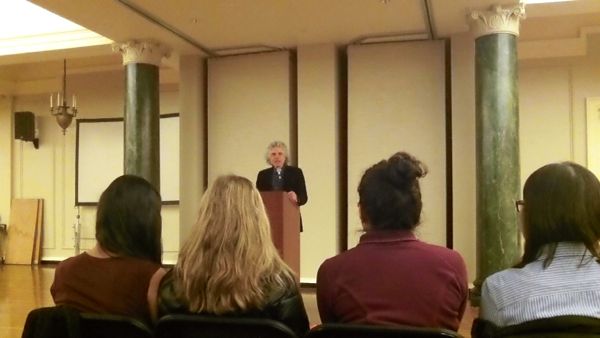There is nothing quite like fixating on a speaker with all your attention, straining to catch every idea as it bursts; to focus as thoughts fly at you, each sharp with crystalline intelligence. That was my overwhelming experience of Professor Steven Pinker’s talk, when he came to Wellesley last Wednesday. A river of overwhelming and unabashed intelligence.
His talk focused on why freedom of speech should be preserved, a topic that I initially questioned since I know of Professor Pinker from his work in psychology. Nevertheless, it soon became clear that he is a philosopher as well as a psychologist, and that he has mulled over this question in depth. That he has mulled over many things in depth, in fact: he read from a paper for a third of the talk and then opened the floor for questions, when he delivered crisp responses to queries as irrelevant to his argument as the best way to combat climate change.
The topics were interesting and novel to me—he touched on how grammar is used in communication, the various forms of communication among people and how this encourages or undermines freedom of speech, the strategies and history of how democracies and dictatorships have shaped their constituents’ language, how freedom of speech is imperative to humans developing new ideas and advancing as a society. My mind often wanders during lectures, but I had this sense that I would never hear these words again, hear these thoughts marshaled in the same way. I was not thinking about the underlying politics surrounding the speaker, evaluating any moral arguments that were presented, trying to understand any unclear assertions. Rather, I was engaged in the references throughout, the dry humor, the seemingly endless evidence supporting the arguments throughout. It was focused. It was very, very clear.
And what I was thinking about when I was walking through the snow from Alumni Hall was how unapologetically firm it was. Prof. Pinker started out in the first five minutes proclaiming that religion and superstition were factually wrong. At one point in the question period, one of our professors made an impassioned plea that her students were not empathizing with the atrocities occurring in the world right now, asking for Prof. Pinker’s advice on how to teach empathy. Prof. Pinker listened attentively, then told us he wanted to make two comments on the question. First, he explained, it should be noted that despite the terrible events that are occurring in the world, violence has in fact been on a downward trend especially since the Industrial Revolution (as he discusses in his book The Better Angels of Our Nature). Most people are not aware of this, because of the greater documentation of atrocities in the news than ever before, which has the well-known psychological effect of making those atrocities seem more common than they actually are probabilistically. This is not to say that that today’s atrocities are acceptable, but it should be acknowledged how far human societies have come. Second, he wanted to relate that he believes most people have a great capacity for empathy, and that the “apathy” that the professor was observing in her students was likely more redolent of helplessness. However, there are ways to encourage more empathy of a cognitive sort, as it has been shown that having exposure to different groups makes people more likely to view the “other” as more similar to themselves. This can be encouraged by emphasizing what we share as humans— the necessity of eating, shelter, love, rather than group or nationalist focuses.
I have encountered this kind of interaction before, in one of my classes at MIT with Prof. Nancy Kanwisher. While we were evaluating the methodology of scientific paper on human fMRI, one of the auditing students asked whether the question would be different under the assumption that evolution didn’t govern history. Prof. Kanwisher listened attentively, then informed the student that there was overwhelming evidence for evolution, and that this wouldn’t be discussed in this class. She then moved us along to the next slide.
In both of these situations, my physical reaction has been to cringe and sink back into my seat. I dislike confrontation, and the intersection of my worlds—evidence-based science, and the moral and emotion-based appeals for various important causes—makes me acutely uncomfortable. I find well-laid out, evidence-based arguments exhilarating, of course. They make me think and teach me about new ideas I never would have developed on my own. I also believe strongly in reading about and listening to others talk about the ethical changes that need to take place in the world, mostly surrounding equality for those who share the innumerable ways of being a minority or different. The latter is something I would not have developed to nearly the same extent had I not attended Wellesley. In my experience, this campus encourages awareness and open-mindedness. It encourages an interest in wider social issues than I would have otherwise attended to, and an acceptance of diversity in the myriad forms that it is expressed in its students. The College, foremost in my mind, encourages respect for the diversity of causes that motivate its students, as we watch our peers independently define success under the umbrella of female empowerment.
My experience at Wellesley has fostered the development of both types of thought—critical, evidence-based thinking, and also a moral imperative for making a positive difference on the world. To see Prof. Pinker not call on emotion at all—to see him firmly stand by logical, cognitive arguments in all of his responses, and more deeply, to reject an emotional, well-structured plea for empathy, to sideline another person’s opinion—I find it unusually unsettling. I’ve been criticized by my friends before, for being too logical, too analytical, for not putting enough emphasis on the emotional undercurrents, for not understanding. I’ve also been told I’m good to come to for advice, precisely because of this drive to look at a situation analytically. Yet I struggle with the notion of informing someone that “your religious beliefs are not factually correct, and that there is evidence to support this”. I struggle with the idea of relating, explicitly and implicitly, that some ideas are better than others, some thinking is better than others, as Prof. Pinker described in his engaging, focused, brilliant talk.
As Prof. Pinker explained, the process of engaging in difficult thinking, in questioning assumptions and evaluating evidence, is itself good for us. He was talking more about innovation and the development of humanity’s future, but I’ll just go on and apply the reasoning to my minor intellectual conundrum :). I am grateful to be in an environment where this kind of contradiction can occur, because my natural inclination is towards the nerdy, the analytic, the esoteric and non-relevant. I am grateful to be at a school where I continually encounter different types of success and people, and am forced to weigh what I find important to what others do.
Finally, I am so grateful to Prof. Pinker for speaking to us, for the many new ideas and the challenging discussion. And for the knowledge that we should all strive for the clarity, depth of thinking, and beauty that defines his diverse contemplations of the world; for his vivid embodiment and definition of his version of success.

